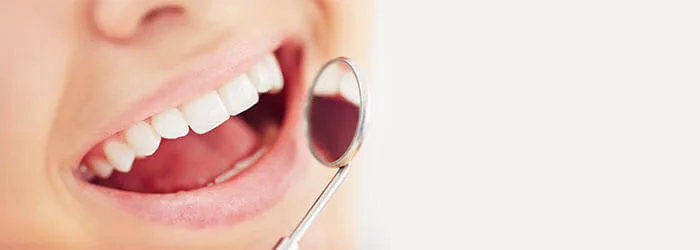Why is Good Oral Hygiene Important?
The effects of poor oral hygiene range from tooth decay and cavities to gingivitis, periodontitis, and tooth loss. Fortunately, proper oral hygiene, including cleaning teeth correctly and regularly, can prevent most of these problems.
If you don’t clean your teeth well every day, you’re putting yourself at risk for tooth decay. Early signs of decay include pain when you bite and feelings of sensitivity or pain in your teeth. When the carbohydrates in the food and drinks that you consume aren’t cleaned from the teeth regularly, they provide fuel for cavity-causing bacteria. These bacteria can start forming plaque on teeth within 20 minutes of eating, so if you’re a frequent snacker, you may want to clean your teeth more often than twice a day. The truth is, bacteria are almost always present in the mouth, and frequent cleaning––and limiting sugary foods––may help prevent decay.
Cleaning teeth also helps prevent cavity-causing bacteria from progressing to gingivitis, or gum disease.
If you develop tooth decay and gum disease as a result of poor oral hygiene, you may be dealing with bills for anything from fillings or crowns to more costly and complicated procedures such as root canals or oral surgery to extract damaged teeth and place dental implants.
How Much Does Dental Cost?
Dental treatment costs can vary. The cost of basic oral hygiene and preventive teeth cleaning is low.
A toothbrush should be replaced every three months or when it appears worn, but that’s just a few dollars. The same goes for dental floss, whether you prefer specialized floss or standard floss. By comparison, the cost of a root canal will depend on the location of the tooth and how many canals are in the tooth that needs the root canal treatment.
Go to Dental Cleanings and Appointments
Also, don’t forget that most dental plans cover at least one, and sometimes two, checkups and cleanings per year at little or no cost to you. It’s better to make and keep those appointments, even if you don’t think you have problems with your teeth or oral hygiene, in order to identify and manage potential problems before costly care is required. Remember that your dentist is your partner in oral health, and be sure to keep him or her informed about medications you take and changes in your overall health so your oral hygiene can be tailored accordingly to maximize your health benefits. Some types of medications (including anti-depressants and some heart medications) increase your risk for gingivitis, so be sure to let your dental professional know if you start taking any new medication, even if you don’t think it will affect your oral health.
A Recommended Dental Care Routine
Keep your teeth clean and cavity-free by following a regular dental care routine of twice-daily tooth brushing and daily flossing. And visit your dental professional at least once a year for a professional cleaning and assessment to catch any problems before they become serious. Your dentist or dental hygienist might also recommend a particular type of toothbrush, dental floss or oral rinse to help you get the most out of your daily dental care routine.
Additionally, there are lifestyle choices that will help keep your teeth clean and gums healthy.
Nutrition Tips
Following a proper and nutritious diet not only helps keep your body healthy, but your mouth as well. Nutrition plays an important role in the health and cleanliness of your teeth, gums and mouth.
Limit Soda, Coffee and Alcohol
Although these beverages contain a high level of phosphorous, which is a necessary mineral for a healthy mouth, too much phosphorous can deplete the body's level of calcium. This causes dental hygiene problems such as tooth decay and gum disease. Beverages containing additives such as corn syrup and food dye can make pearly white teeth appear dull and discolored. Therefore, it is best to choose beverages like milk, which helps strengthen teeth and build stronger enamel, giving you a healthy, beautiful smile.
Drink Tap Water When Possible
If bottled water is your main source of drinking water, you could be missing the decay-preventive benefits of fluoride.
Monitor Your Low-Carb Lifestyle
Despite their popularity, low-carb diets can cause bad breath. A balanced, dental-healthy diet can help reduce tooth decay.
Increase Your Calcium Intake
After age 20, both men and women lose more bone mass than they form so it is important to restore lost calcium with a daily supplement and by eating fruits and vegetables high in calcium, such as dark leafy greens. These foods will also help to lower the acid buildup in the saliva that can lead to breakdown of tooth enamel.
Take a Daily Dose of Vitamins C and D
These vitamins help support the absorption of healthy mouth minerals such as calcium and phosphorous, which support the bone and gum tissue, keeping it healthy. This is an easy way to maintain dental hygiene and fight gum disease.
Put Out the Cigarette
Smoking cigarettes is one of the greatest contributors to the aging mouth. According to the Center for Disease Control, more than 22 million women in the United States smoke cigarettes. In addition to staining teeth, smoking interrupts calcium absorption in the body and can also cause potentially life-threatening diseases such as oral cancer. So, stop smoking and enjoy the health benefits as well as a healthy, beautiful smile.

Sign Up
for expert advice and exclusive offers









